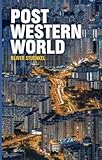Post-western world : how emerging powers are remaking global order / Oliver Stuenkel.
Material type: TextLanguage: Spanish Publication details: Malden, MA : Polity Press, 2017.Description: x, 251 p. : ill. ; 22 cmISBN:
TextLanguage: Spanish Publication details: Malden, MA : Polity Press, 2017.Description: x, 251 p. : ill. ; 22 cmISBN: - 9781509504572 (pbk. : alk. paper)
- 1509504575 (pbk. : alk. paper)
- World politics -- 21st century
- East and West
- Developing countries -- Foreign relations -- 21st century
- International relations
- International economic relations
- International organization
- Política mundial -- Siglo XXI
- Relaciones Este-Oeste
- Países en desarrollo -- Relaciones exteriores -- Siglo XXI
- Relaciones internacionales
- Relaciones económicas internacionales
- Organización internacional
- Política internacional
- Países en desarrollo -- Relaciones exteriores -- Siglo XXI
- 327
- JZ 1310 S933p 2017
| Item type | Current library | Home library | Collection | Shelving location | Call number | Vol info | Copy number | Status | Date due | Barcode |
|---|---|---|---|---|---|---|---|---|---|---|
 Libro
Libro
|
Biblioteca Juan Bosch | Biblioteca Juan Bosch | Ciencias Sociales | Ciencias Sociales (3er. Piso) | JZ 1310 S933p 2017 (Browse shelf(Opens below)) | 3 | 1 | Available | 00000121428 |
Browsing Biblioteca Juan Bosch shelves, Shelving location: Ciencias Sociales (3er. Piso), Collection: Ciencias Sociales Close shelf browser (Hides shelf browser)

|

|

|

|

|

|

|
||
| JZ 1310 S192c 2007 Conversaciones sobre política, mercado y convivencia / | JZ 1310 S192c 2008 Conversaciones sobre política, mercado y convivencia / | JZ 1310 S678r 2008 Relations internationales / | JZ 1310 S933p 2017 Post-western world : how emerging powers are remaking global order / | JZ 1310 S961a 2014 Les aventures de la mondialisation : les relations internationales au début du XXIe siècle / | JZ 1310 Z86c 2000 Cosmópolis : perspectiva y riesgos de un gobierno mundial / | JZ 1312 B136h 2019 L'hégémonie contestée : les nouvelles formes de domination internationale / |
Includes bibliographical references and index.
The birth of Western-centrism -- Power shifts and the rise of the rest -- The future of soft power -- Towards a parallel order : finance, trade and investment -- Towards a parallel order : security, diplomacy and infrastructure -- Post-Western world.
With the United States superpower status rivalled by a rising China and emerging powers like India and Brazil playing a growing role in international affairs, the global balance of power is shifting. But what does this mean for the future of the international order? Will China dominate the 21st Century? Will the so-called BRICS prove to be a disruptive force in global affairs? Are we headed towards a world marked by frequent strife, or will the end of Western dominance make the world more peaceful? In this provocative new book, Oliver Stuenkel argues that our understanding of global order and predictions about its future are limited because we seek to imagine the post-Western world from a parochial Western-centric perspective. Such a view is increasingly inadequate in a world where a billions of people regard Western rule as a temporary aberration, and the rise of Asia as a return to normalcy. In reality, China and other rising powers that elude the simplistic extremes of either confronting or joining existing order are quietly building a "parallel order" which complements today s international institutions and increases rising powers' autonomy. Combining accessibility with expert sensitivity to the complexities of the global shift of power, Stuenkel s vision of a post-Western world will be core reading for students and scholars of contemporary international affairs, as well as anyone interested in the future of global politics.


There are no comments on this title.